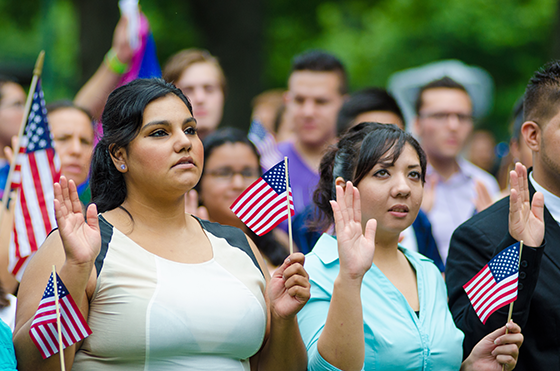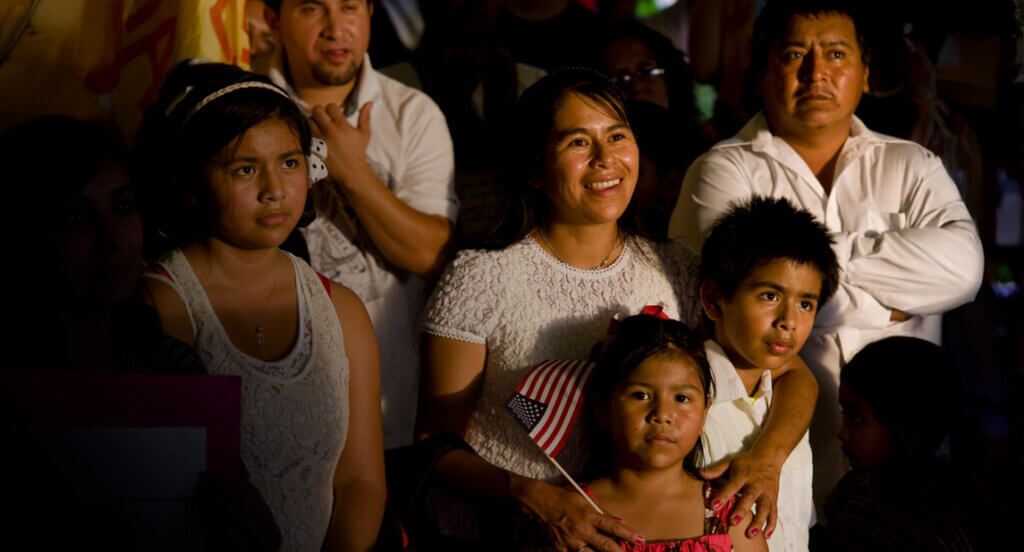Behind Dire Headlines, There Is Some Good News on the Immigration Front
Every day, news articles highlight the number of immigrants seeking asylum and refuge within the United States. While some mention the legal services work being done along the border and in communities across the country, only a few focus on the ongoing expansion of legal orientation and representation to newly arrived immigrants. That’s too bad — because behind the headlines that often frame the number of asylum seekers at the border as a seemingly intractable problem, there is some good news too.
Even as lawmakers have failed to enact essential immigration reforms, community-based organizations are stepping up to provide critical information so immigrants can learn about potential options to stay in the United States and the complex legal road required to pursue them. Explaining asylum or humanitarian parole options is difficult and requires trained legal service providers, a task made even more challenging because of extensive disinformation campaigns. U.S. Citizenship and Immigration Services recently issued an alert echoing what immigration legal service providers know – there has been an increase in scams and predatory behavior targeting individuals who may be considered for parole under new processes.
When President Biden recently visited El Paso, he met with community leaders, and Department of Homeland Security Secretary Alejandro Mayorkas will do the same as he visits Miami this week. The community-based organizations providing immigration legal services should certainly share their perspective on what policy solutions are needed. But whether the policymakers act on them or not, they can invest in the critically needed system of immigration legal service providers.
A recent article profiled the work that Catholic Legal Services has been doing in Miami since 1998. It describes the clients and the staff as a “microcosm of Miami’s immigrant fabric” including Cubans, Haitians, Venezuelans, and Nicaraguans who are fleeing gangs, deteriorating conditions in their home countries and government repression. The article reports that the agency is “seeing about 3,000 people a month. They help them fight deportation orders, apply for naturalization, win asylum cases, secure work permits, and other immigration needs.” The staff at Catholic Legal Services, like many other nonprofit immigration legal service providers, often come from the community, speak more than one language, and understand what it is like to be daunted by immigration forms. According to the article, “the administrative assistant manning the front desk knows what it’s like to be on the other side of the waiting room. She arrived from her native Port-au-Prince less than two years ago. Catholic Legal Services helped her obtain Temporary Protected Status. Now, with her permanent residence pending, she gets to help people in similar situations.” Another example is an accredited representative—a non-lawyer certified by the Department of Justice to provide immigration advice, typically at low cost, without running afoul of rules to prevent the unauthorized practice of law—who fled Cuba in 1994 assisting an asylum seeker from the island who arrived in Miami in April 2022.
Communities like Miami and El Paso have been welcoming immigrants for generations, and similarly, in communities across the country, immigration legal service providers are stretching to meet the need. A report by the Center for Migration studies documents the massive gap in the capacity of nonprofit legal service providers to meet the demands they face. A recent article describes what this looks like in Tennessee: “Across Tennessee, in both rural and urban areas, demand for immigration legal services far exceeds supply and the need has grown more acute as immigrant communities have expanded. The issue affects the ability for newcomers to avoid deportation, obtain drivers’ licenses and work permits, access benefits they are eligible for and engage more fully in their communities.” As the director of
UnidosUS Affiliate, Tennessee Immigration & Refugee Rights Coalition states, “for over a decade now, Tennessee has had a really fast-growing immigrant population. There hasn’t been enough infrastructure that has been built to support that rapid growth.” That’s the bad news.
The good news is that governments and nonprofits are stepping up to help fill the gap. Important investments have been made in nonprofit legal services infrastructure. For example, Miami-Dade County used some of the American Rescue Plan Act (ARPA) funding for UnidosUS affiliate, Hispanic Unity, to assist Venezuelans in completing applications for Temporary Protected Status. In Nashville, the Metropolitan Government of Nashville and Davidson County invested $1.8 million of its ARPA funds in immigration legal services. The FY 23 omnibus spending bill signed in December includes a modest, if still insufficient, increase to $25 million for the Citizenship and Integration grant program that supports community-based organizations providing citizenship application assistance to eligible permanent residents. The bill also includes a new $800 million investment to state and local governments and NGOs providing shelter and respite to recently arrived immigrants and $20 million for a new program intended to provide community-based case management services for asylum seekers and immigrants in removal proceedings.
Private philanthropy is also stepping up. At the recent National Immigrant Inclusion Conference, representatives of foundations and nonprofit service providers engaged in extensive dialogues about the need to expand the immigrant legal services network. And last fall, philanthropist MacKenzie Scott announced what many hope will be just the first tranche of funding to some immigration organizations.
It is worth repeating that the administration and Congress must work to provide long term, sustainable and humane solutions. Whether or not they find it possible to enact legislation, it is clear that by working with state and local governments and private philanthropy, they can make impactful and immediate investments in immigration legal services programs.



